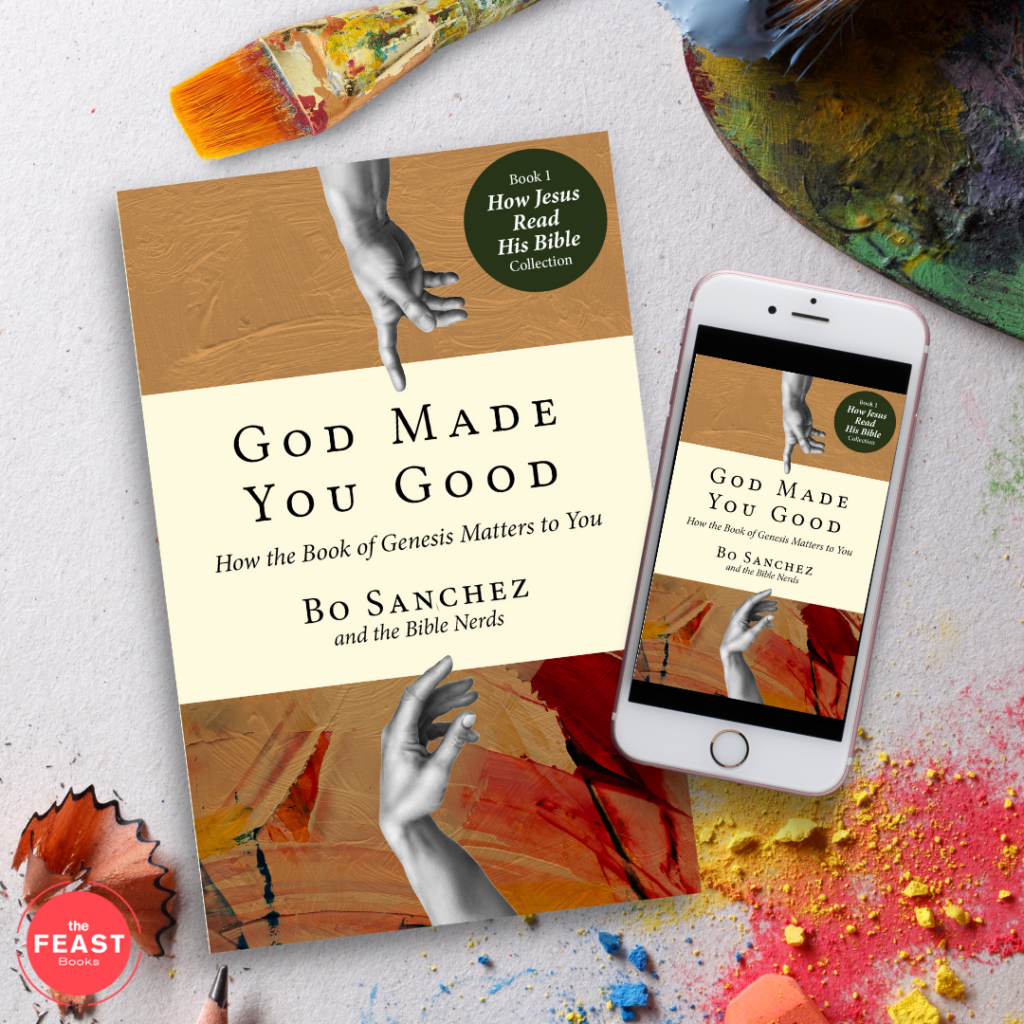by Bo Sanchez with Bene Sanchez
Yes, He did.
Even if that goodness isn’t too obvious.
Because all we see are our weaknesses.
But Genesis says God made people good.
He made our world good.
The reason the world is messed up is we messed things up.
We made wrong choices. But originally, things were pretty tov.1
This is what the first sentence in the Bible says: “In the beginning God created the heavens and the earth. The earth was formless and empty, and darkness covered the deep waters. And the Spirit of God was hovering over the surface of the waters [emphasis added]” (Genesis 1:1-2, NLT).
Isn’t it strange?
For us modern people, we always think that before Creation, there was nothing. Nada. Zero. But ancient people thought differently, not only in Genesis but also in the other Creation stories from Babylon, Assyria, Egypt, and Mesopotamia. They believed there was always something before Creation, and this something was “formless and empty.”
Genesis also described this “something” as “darkness covered the deep waters.” Note that these two conditions—first, darkness, and second, chaotic waters—are obstacles to life. But to the authors of Genesis, these two obstacles cannot stop God.
God is greater than darkness and chaos. Effortlessly, without any struggle, He deals with them in the first three days of Creation.

Days 1 to 3: Boundaries Are Life-giving
On Day 1, God said, “Let there be light,” and there was light.He did this by separating light from darkness.
On Day 2, God separated the waters above from the waters below. This sounds strange to modern ears, but focus on what the author was trying to say. God did not get rid of darkness or the chaotic waters. Instead, He contained them. He set boundaries.
On Day 3, God made the dry land rise from the waters. He created a refuge from the chaos. And He even gave a bonus: Fruit trees grew on the land, which represented God’s abundance for us.
Genesis is saying, “This God is so loving, He created a beautiful place where we can experience His blessings.”

Biblical Authors Use Patterns a Lot
Remember how pre-Creation was formless and empty?
That’s the outline of the seven days of Creation.
From Days 1 to 3, God deals with formlessness. He sets boundaries. He puts order amidst the chaos.
From Days 4 to 6, God deals with emptiness. He fills the earth with His goodness.
Before we discuss Days 4, 5, and 6, I need you to know that biblical authors love creating patterns everywhere and the Genesis author is no different. If you observe carefully, Day 1 connects with Day 4, Day 2 connects with Day 5, and Day 3 connects with Day 6.
Let me show this to you . . .
Days 4 to 6: God Shares His Role with You
On Day 4, God fills the sky with stars, the sun, and the moon—but the author calls them little lamp and the big lamp. Day 4 connects with Day 1 because, on Day 1, it is God who gives light. On Day 4, God assigns the sun and the moon to take that role of giving light. God is already sharing His role with His creatures.
On Day 5, God fills the waters below with fish and birds to fly near the water above—the very waters He separates on Day 2. Here again, God is passing on His role by blessing His creatures with their own ability to multiply and make new life.
On Day 6, the last day of creation, God creates all the land animals, the crawling creatures, and the wild animals to fill the dry land. And at the very end, He creates humans.
When He does, God does not just bless the humans (like the fish) to multiply, nor does He just give them a special role (like the lamps in the sky) to rule on the dry land. God calls them His images.
This is a huge statement. In the ancient world, people would make little statues out of wood or metal to represent a certain god or deity. They would place them in that god’s temple, and they would offer sacrifices to the little statues on behalf of the god they worshiped. That statue represented that god’s presence and power in the world.
In the Bible, God commanded His people not to make any statues or representations of Him. Because in Genesis, God Himself has made an image or an idol2 for Himself—the humans.
Being His image meant that God wanted creation to experience His power and authority through humans. This high view of humanity is something that was unique in Genesis.
Explore more of the implications of this in Bo Sanchez’s newest book, God Made You Good.
____________________________________________
1 Tov or בוט is the Hebrew word for good.
2The word image used in all our English translations of the Bible is the standard Hebrew word for idol.
*This excerpt was taken from GOD MADE YOU GOOD by Bo Sanchez, available for pre-selling at http://www.feastbooks.ph!




